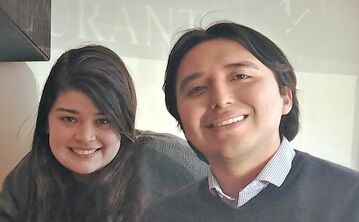Cultural Sovereignty Fellowship
 Jessica Lee and Eldred D. Lesansee
Jessica Lee and Eldred D. Lesansee
REMARKS FROM OUR CURRENT FELLOWS:
"It feels great to use my degree for Indian Country advocacy!"
~ Jessica Lee, Wichita/Kickapoo
"After gaining vital work experience in Indian Country, I can now better identify
where I am most needed to make positive instrumental change in my tribal communities."
~ Eldred D. Lesansee, Pueblo
*We are no longer accepting applications*
For a full description of the position, please read here. To apply for this important fellowship position, please provide the following documentation
The ASSOCIATION ON AMERICAN INDIAN AFFAIRS is seeking recent graduates for its CULTURAL SOVEREIGNTY FELLOWSHIP, a one-year paid fellowship position. The applicant must have or will graduate between January 2017 and June 2019 from an undergraduate, graduate or professional degree program. A CULTURAL SOVEREIGNTY FELLOW will receive a stipend starting at $35,000 depending on the applicant’s degree program and level of experience. The job location is in the metro DC area, in Maryland.
The CULTURAL SOVEREIGNTY FELLOW will support the development of national policy in Indian affairs, and provide research, analysis and writing to support programs that include youth education, juvenile justice issues, Indian child welfare, sacred site protection, repatriation, protection of cultural heritage, federal acknowledgement, environmental security, and other program issues.
The ASSOCIATION ON AMERICAN INDIAN AFFAIRS is the oldest non-profit serving Indian Country protecting sovereignty, preserving culture, educating youth and building capacity. The Association was formed in 1922 to change the destructive path of federal policy from assimilation, termination and allotment, to sovereignty, self-determination and self-sufficiency. Throughout its 96-year history, the Association has provided national advocacy on watershed issues that support sovereignty and culture, while working on the ground at a grassroots level with Tribes to support the implementation of programs that affect lives on the ground.
For a full description of the position, please read here. To apply for this important fellowship position, please provide the following documentation
- Cover Letter stating, among other things, how the Fellowship will support your career working in Indian Country or with Indigenous communities
- Resume
- Current or final transcript (does not need to be a sealed official transcript)
- Two writing samples, that are original work, that total no more than 15 pages
- One written recommendation from a professor or Tribal leader
- Three references that include one personal and two professional references
The ASSOCIATION ON AMERICAN INDIAN AFFAIRS is seeking recent graduates for its CULTURAL SOVEREIGNTY FELLOWSHIP, a one-year paid fellowship position. The applicant must have or will graduate between January 2017 and June 2019 from an undergraduate, graduate or professional degree program. A CULTURAL SOVEREIGNTY FELLOW will receive a stipend starting at $35,000 depending on the applicant’s degree program and level of experience. The job location is in the metro DC area, in Maryland.
The CULTURAL SOVEREIGNTY FELLOW will support the development of national policy in Indian affairs, and provide research, analysis and writing to support programs that include youth education, juvenile justice issues, Indian child welfare, sacred site protection, repatriation, protection of cultural heritage, federal acknowledgement, environmental security, and other program issues.
The ASSOCIATION ON AMERICAN INDIAN AFFAIRS is the oldest non-profit serving Indian Country protecting sovereignty, preserving culture, educating youth and building capacity. The Association was formed in 1922 to change the destructive path of federal policy from assimilation, termination and allotment, to sovereignty, self-determination and self-sufficiency. Throughout its 96-year history, the Association has provided national advocacy on watershed issues that support sovereignty and culture, while working on the ground at a grassroots level with Tribes to support the implementation of programs that affect lives on the ground.









